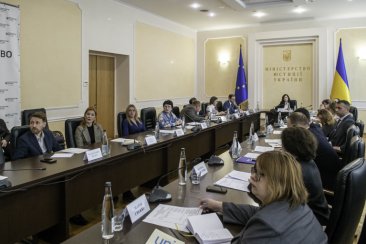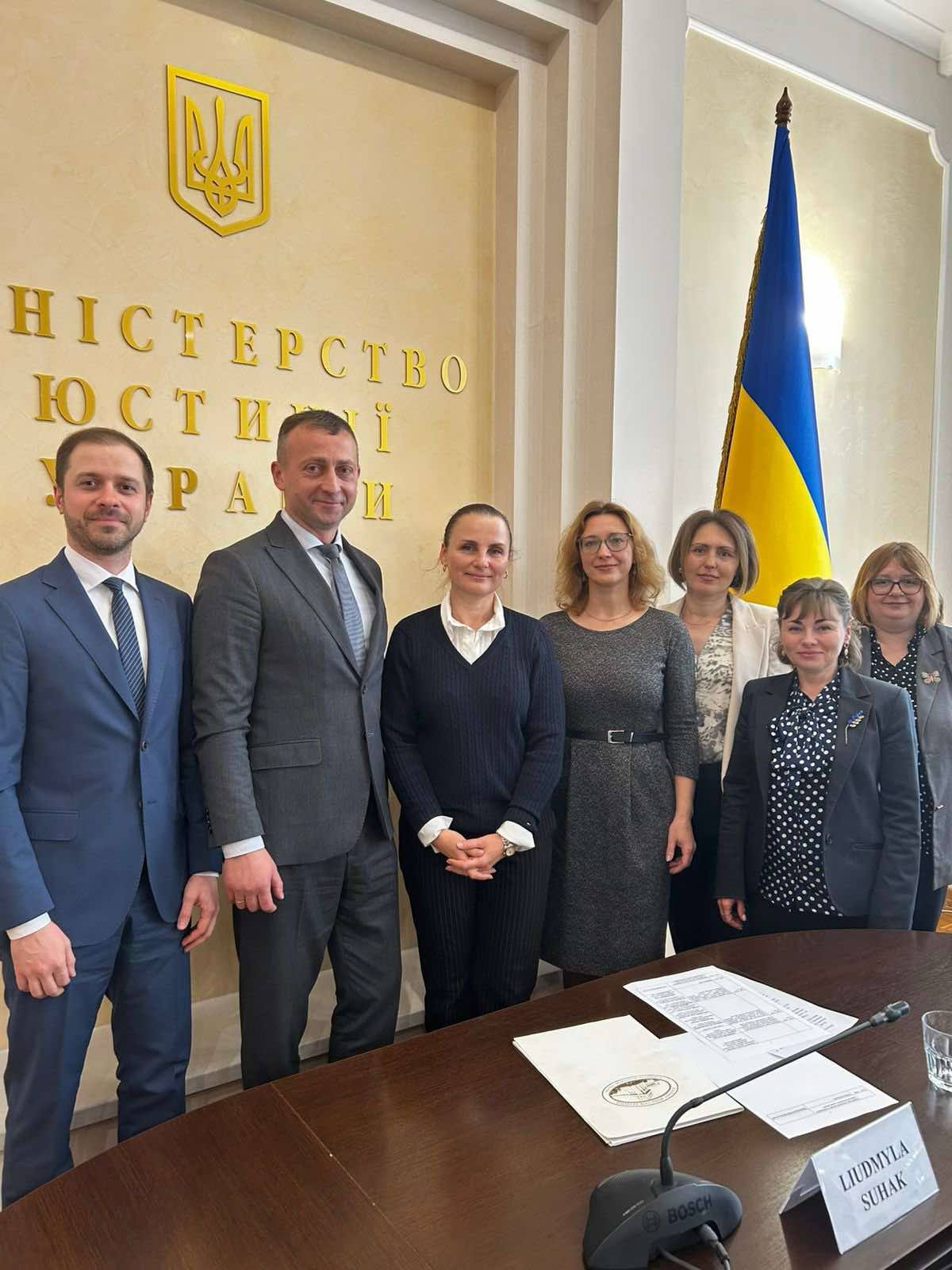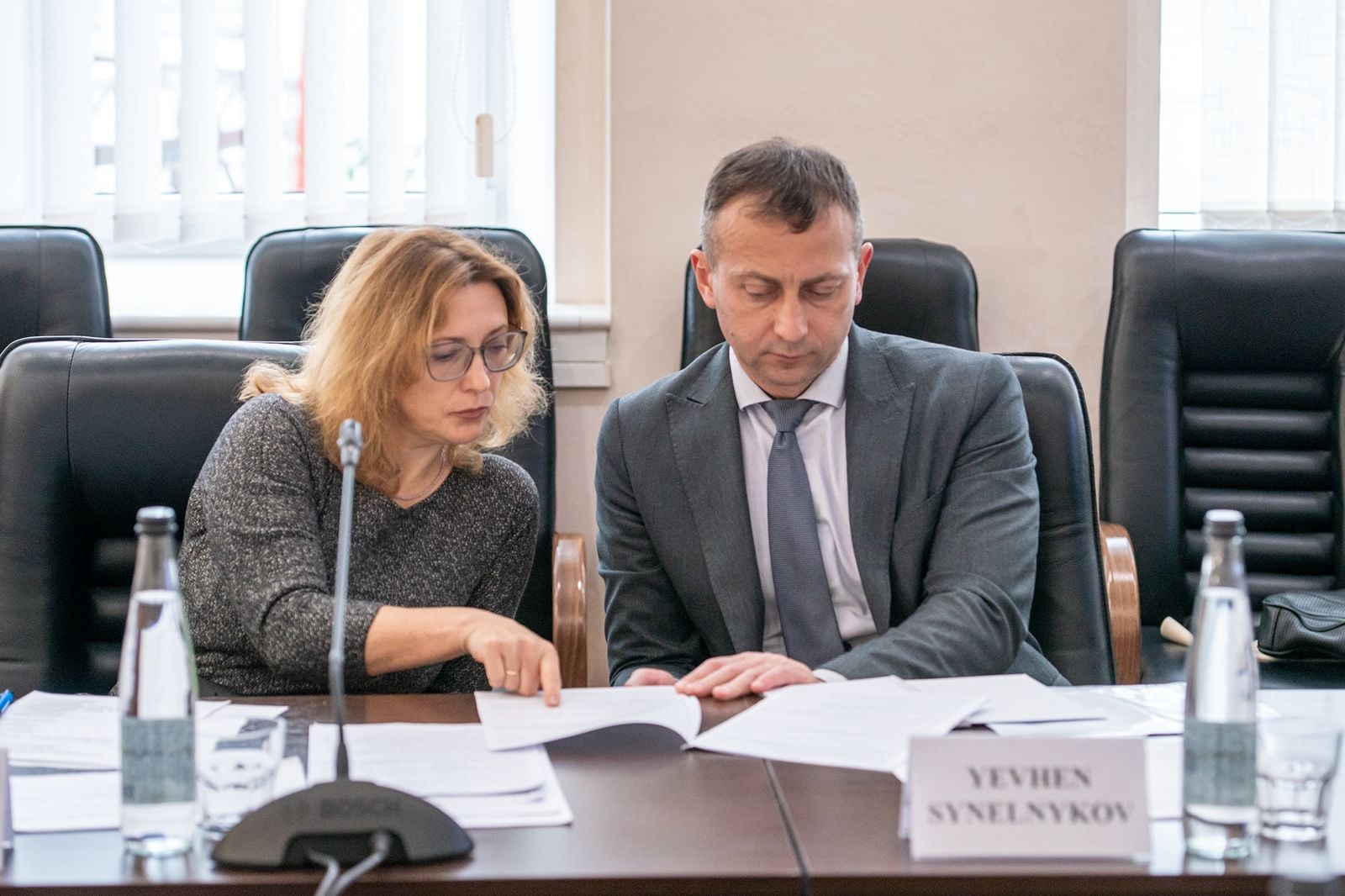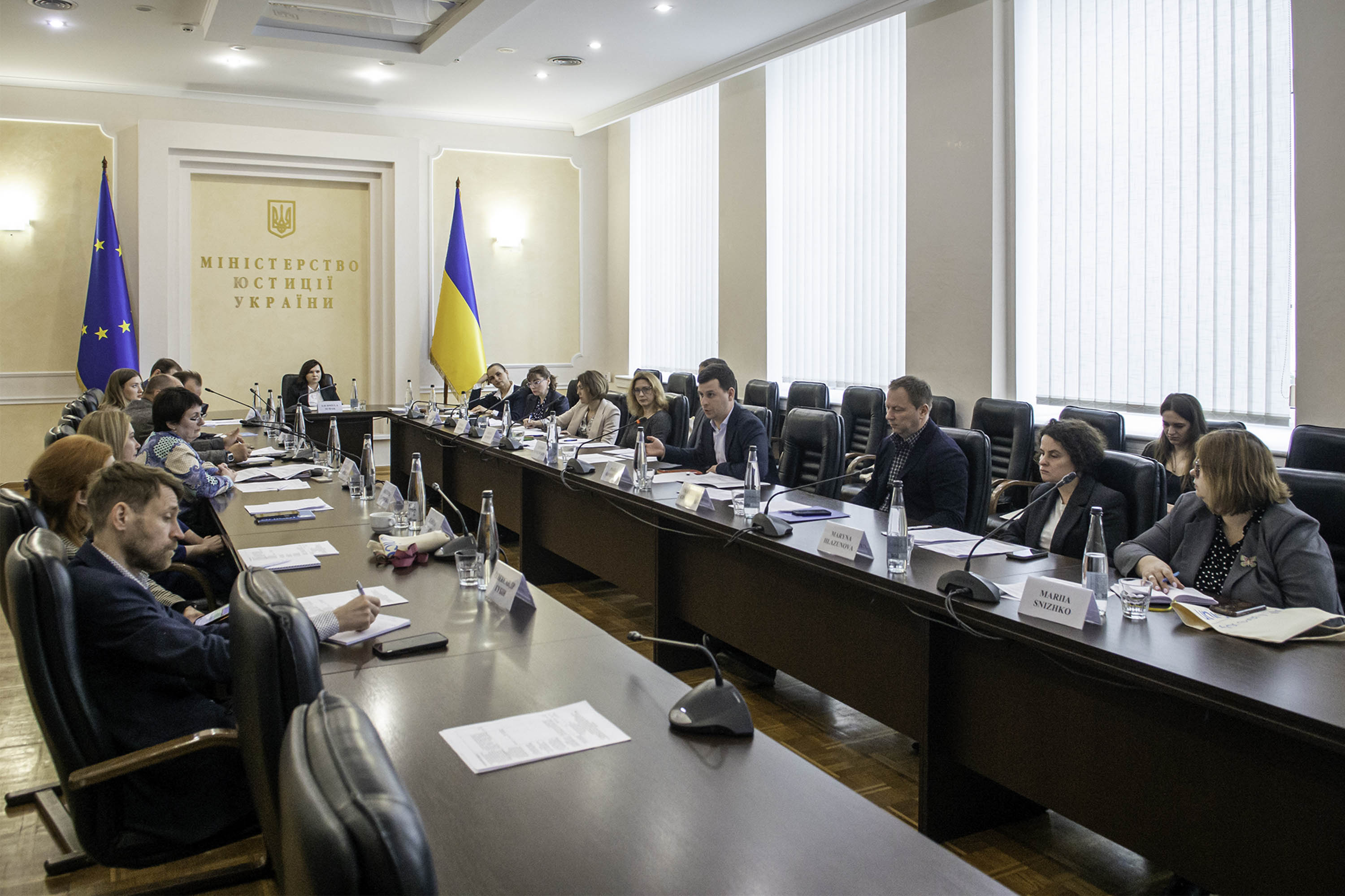Contact center of the Ukrainian Judiciary 044 207-35-46

The formulation of the operative part of decisions on the return of a child to a foreign country under the Convention on the Civil Aspects of International Child Abduction (The Hague Convention of 1980) and ensuring their enforcement—this was the topic discussed during a roundtable featuring Supreme Court judges of the Civil Cassation Court, Yuliia Cherniak, Olena Bilokon, and Yevhen Synelnykov.
The event was attended by judges, including Ukraine's contact judges for the IHNJ (the International Hague Network of Judges), attorneys, and representatives of the relevant departments of the Ministry of Justice of Ukraine. Experts from the United Nations Children's Fund (UNICEF) in Ukraine also joined the roundtable.
The discussion focused on the challenges associated with the legal connection between the wording of the operative part of court decisions on the return of a child to the state of permanent residence and the ability to enforce them, as well as on developing ways to resolve problematic issues. Information was also presented on the decisions made by the courts in 2022-2024. These include cases on the return of children to Italy, Hungary, Lithuania and Poland. In some cases, the decisions entered into force but were not enforced because they did not provide for a clear mechanism for the transfer of the child, for example, only obliging the debtor to ‘return the child’ without regulating the enforcement mechanism in case of refusal.

In her welcome address to the roundtable participants, Yuliia Cherniak said, "We are faced with the challenging task of developing recommendations within the highly complex field of family law. This requires us to strike a balance between promptly returning a child to their habitual place of residence and considering their best interests."
The judge provided an overview of the current case law on child return under the 1980 Hague Convention, discussing the challenges that arise when making and enforcing decisions. She noted that, since the start of Russia's full-scale invasion of Ukraine, the number of cases had decreased and the timeframe for their consideration had shortened. This is in line with the state's obligation to ensure prompt procedures for returning a child to their habitual residence.
Among the main grounds for granting a cassation appeal and, accordingly, overturning the decisions of lower courts, the judge named violations of procedural law, incorrect interpretation of substantive law provisions—specifically point “b” of part 1 of Article 13 of the Convention—as well as equating disputes over the return of a child with disputes concerning the determination of the child’s place of residence or guardianship. This led, in turn, to the incorrect determination of the issues of proof in the case and the improper qualification of the contested substantive legal relations.
The judge drew special attention to the Supreme Court's resolution of 16 April 2025 in case No. 545/3933/21 on the return of the child to the previous place of residence in the United Kingdom of Great Britain and Northern Ireland by taking the child away. The prerequisite for filing the claim in this case was the mother’s failure to comply with a court decision in another case — No. 552/1759/19 (concerning a claim to recognize the unlawful removal and retention by the defendant of a minor child on the territory of Ukraine, and the return of the minor to their habitual residence in the United Kingdom of Great Britain and Northern Ireland). According to Yuliia Cherniak, this case is illustrative, as the Supreme Court once again referred to a systematic interpretation of two conventions (the 1980 Hague Convention and the 1996 Hague Convention) and formulated a legal conclusion that, in the presence of a final and binding court decision regarding the return of the child to the United Kingdom which remains unenforced, and in the absence of consent from the competent authority (court) of the United Kingdom (the foreign state to which the child is to be returned) regarding jurisdiction over the issue of child removal—which essentially constitutes determining the child’s place of residence in the United Kingdom—the matter of child removal also falls within the jurisdiction of the courts of the United Kingdom and is not subject to consideration by the courts of Ukraine. The proceedings were closed pursuant to paragraph 1 of part 1 of Article 255 of the Civil Procedure Code of Ukraine.

Yuliia Cherniak emphasised the recommendation of the Hague Conference on Private International Law regarding the need for a detailed formulation of the operative part of the judgments, in particular, with a hierarchical list of options for the enforcement of the judgement, as well as the importance of mediation and settlement agreements, including at the stage of enforcement of the judgement. According to the judge, a special procedure for the enforcement of court decisions obliging the return of a child should be developed and approved. This procedure would take into account the specific nature of enforcing decisions in this category of cases and put an end to the practice of applying Article 64 of the Law of Ukraine "On Enforcement Proceedings" ("Enforcement of decisions regarding the removal of a child") to these cases by analogy. This procedure may include, inter alia, the need to prepare documents for crossing the state border of Ukraine and entering the territory of a foreign state, resolving organisational, logistical and financial issues related to a foreign trip, etc.
Olena Bilokon focused on the application of the principle of the best interests of the child, which is enshrined in the 1980 Hague Convention and is decisive in matters of returning a child to the country of his or her habitual residence.
"Any decision that concerns the interests of the child must ensure that the child lives in a safe, caring environment where he or she can grow and develop properly," the judge stressed. One of the ways to determine the best interests of the child in a particular family situation is to seek the child's opinion. The 1980 Hague Convention provides for exceptions under which the competent authority may refuse to return the child, in particular, in the event of a serious risk that the child's return would cause physical or mental harm, the child objects to such return and has reached the age at which his or her opinion should be taken into account.
The speaker placed a special emphasis on the clear wording of the operative part of court decisions. Based on the principle of the best interests of the children, in cases concerning the return of children to their country of habitual residence, the court is vested with broader powers and may depart from the principle of discretion in accordance with Article 45 of the Civil Procedure Code of Ukraine and determine the procedure for enforcing the decision when issuing it (Article 267 of the CCP of Ukraine), taking into account the specific circumstances of each family situation.
The judge noted that at the stage of enforcement of court decisions in this category of cases, it is advisable to remind the parties of the possibility of using mediation or other alternative ways to resolve a family conflict that would best serve the interests of children.
Finally, Olena Bilokon emphasised: "Today we are talking about the fact that a court decision regarding children is always about balancing the interests of children, parents and society. We put the interests of children at the heart of a court decision, but even at the stage of its execution, we must remember that it is best for the child if the parents agree and make a joint peaceful resolution of the conflict."
Yevhen Synelnykov drew attention to the current challenges associated with the enforcement of decisions on the return of a child in accordance with the 1980 Hague Convention. He said that the interest of the international legal community in this topic was confirmed during his lecture to the Honourable Society of the Middle Temple in England and Wales, where the issue of mechanisms for the enforcement of such court decisions under martial law in Ukraine was raised.

The judge upheld the position that in cases of child return, it is not a question of determining parental custody, but only of returning to the state of habitual residence. Therefore, in his opinion, it is inappropriate to make a separate claim for the removal of the child, in particular with reference to Article 162 of the Family Code of Ukraine. However, this raises a controversial issue regarding the procedure and method of enforcement of court decisions, as in practice there are difficulties with enforcement - primarily due to the lack of proper legislative regulation.
Yevhen Synelnykov noted that other legal systems, in particular the courts of European countries that deal with family cases, have clear and effective procedures that provide for the immediate enforcement of decisions on the return of children. Such practices, in his opinion, should be studied and adapted to Ukrainian realities to ensure the effectiveness of court decisions.
The speaker also emphasised the difficulty of applying Article 430 of the Civil Procedure Code of Ukraine to decisions on the return of a child, since this article, like Article 162 of the Family Code of Ukraine, contains similar wording, but does not cover the specifics of the enforcement mechanism in cases governed by the 1980 Hague Convention. As a result, the judge supported the proposal to define the method and procedure for the enforcement of such judgments in the operative part and expressed his readiness for further discussion and development of relevant solutions within the legal community.
The roundtable was organised at the initiative of the Ministry of Justice of Ukraine and with the support of the United Nations Children's Fund (UNICEF) in Ukraine.
Photo courtesy of the organisers.